

A Social Entrepreneur’s Dilemma - Nonprofit or For-Profit? How do you turn a charity into a business ... and why would you? In Kenya, one can drive for hours at a time and see village after village with no electricity.
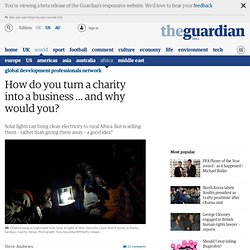
One charity cannot solve the problem of power just as they can't solve many of Africa's other big challenges such as clean water, decent education, irrigation, medicine and food. For Profit or Nonprofit? That Is the Question. NPQ Editors’ note: NPQ noticed a comment from Stephanie on one of our articles, and thought that her question about starting up a new organization to serve the health needs of low-income women was worth a larger audience.
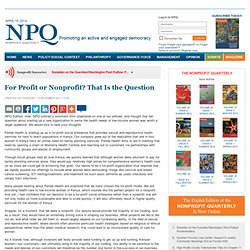
We would love to hear your thoughts. Penda Health is starting up as a for-profit social enterprise that provides sexual and reproductive health services for hard to reach populations in Kenya. Our company grew out of the realization that one in four women in Kenya have an unmet need for family planning services. Penda Health aims to aid in meeting that need by opening a chain of Women's Health Centres and reaching out to customers via partnerships with community groups and places of employment.
Asheville homeless bagel bakers to help selves. A new bagel business wants to give homeless people a way to help themselves - one crispy, chewy, cream-cheese-slathered bite at a time.
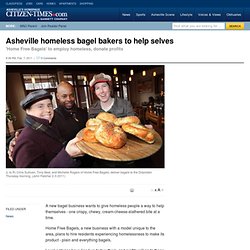
Home Free Bagels, a new business with a model unique to the area, plans to hire residents experiencing homelessness to make its product - plain and everything bagels. Local eateries have lined up to buy them, and profits will go to those struggling with housing. Founder Chris Sullivan said the business will fill both a social and culinary gap, first, by employing people who would otherwise have trouble finding work because of lack of experience, criminal records or other problems. "It's not just a nonprofit handing out help. It's an opportunity for people who need that help, creating the opportunities themselves," said Sullivan, 30, who experienced a brief period of homelessness herself.
Secondly, it will serve customers craving the broiled and baked bread most popular in the Northeast. Starting a Self-Sustainable Nonprofit. Can a charitable nonprofit be profit-making and sustainable without donations?
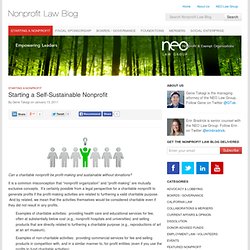
It is a common misconception that “nonprofit organization” and “profit-making” are mutually exclusive concepts. It’s certainly possible from a legal perspective for a charitable nonprofit to generate profits if the profit-making activities are related to furthering a valid charitable purpose. And by related, we mean that the activities themselves would be considered charitable even if they did not result in any profits. Examples of charitable activities: providing health care and educational services for fee, often at substantially below cost (e.g., nonprofit hospitals and universities) and selling products that are directly related to furthering a charitable purpose (e.g., reproductions of art at an art museum).
Thrifting Goes Upscale And High-Tech. Hide captionLisa Tumbarello, a stylist trained by Stacy London from TLC's What Not to Wear, encourages customer Tom Spinelli to buy some ties at a Goodwill trunk show at Caramel, a boutique in Washington, D.C.
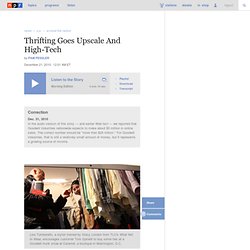
Abby Verbosky/NPR Lisa Tumbarello, a stylist trained by Stacy London from TLC's What Not to Wear, encourages customer Tom Spinelli to buy some ties at a Goodwill trunk show at Caramel, a boutique in Washington, D.C. Think that designer blouse you're giving away to Goodwill will wind up in a thrift store? Think again. These days, Goodwill Industries, like many nonprofits that are searching for better ways to raise money and broaden their appeal, isn't going the traditional route with some of its designer donations. Like trunk shows. Professional stylist Lisa Tumbarello was on hand to help customers. Rescuing Diabetic Supplies. December 8, 2010; Source: Fox/News Bulletin | You can't argue with the logic that underpins a nonprofit that buys unused diabetes testing supplies and resells them well-below full price.
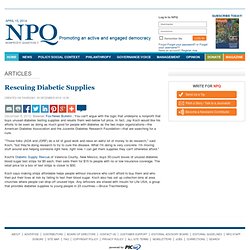
In fact, Jay Koch would like his efforts to be seen as doing as much good for people with diabetes as the two major organizations—the American Diabetes Association and the Juvenile Diabetes Research Foundation—that are searching for a cure. "Those folks (ADA and JDRF) do a lot of good work and raise an awful lot of money to do research," said Koch, "but they're doing research to try to cure the disease.
What I'm doing is very concrete. I'm moving stuff around and helping someone right here, right now. Water, Microfinance and Innovation (November 12, 2010) Although the market demand exists, there have not been sustainable ways to finance basic water needs.
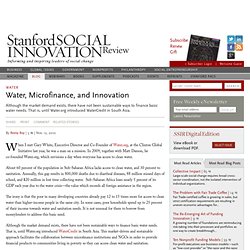
That is, until Water.org introduced WaterCredit in South Asia. When I met Gary White, Executive Director and Co-Founder of Water.org, at the Clinton Global Initiative last year, he was a man on a mission. In 2009, together with Matt Damon, he co-founded Water.org, which envisions a day when everyone has access to clean water. About 60 percent of the population in Sub-Saharan Africa lacks access to clean water, and 30 percent to sanitation. Annually, this gap results in 800,000 deaths due to diarrheal diseases, 88 million missed days of school, and $20 million in lost time collecting water. The irony is that the poor in many developing countries already pay 12 to 15 times more for access to clean water than higher-income people in the same city.
Although the market demand exists, there have not been sustainable ways to finance basic water needs. Growing Pains for Social Entrepreneurs. The appeal of “doing well by doing good” is enormous.
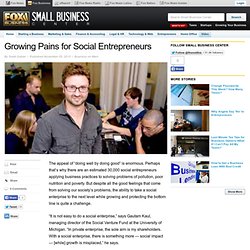
Perhaps that’s why there are an estimated 30,000 social entrepreneurs applying business practices to solving problems of pollution, poor nutrition and poverty. But despite all the good feelings that come from solving our society’s problems, the ability to take a social enterprise to the next level while growing and protecting the bottom line is quite a challenge. “It is not easy to do a social enterprise,” says Gautam Kaul, managing director of the Social Venture Fund at the University of Michigan. “In private enterprise, the sole aim is my shareholders. NC organic bread flour project moves one step closer to fruition. Artisan bread lovers take note: The long-fought effort to provide grow and mill hard wheat for discerning area bakers has resulted in the creation of a hybrid company that puts the love of organic flour on an equal footing with the need to earn a profit.

Jennifer Lapidus’ multiyear effort recently resulted in registering Carolina Ground as a North Carolina “L3C” company, according to a recent blog post on the North Carolina Organic Bread Flour Project’s website. Here’s how Lapidus describes the company: “An L3C is a sort of hybrid between an LLC and a 501 C-3, in other words, it is a mission-driven for-profit business; it’s also know as a “low-profit” company.
Carolina Ground, L3C will be structured as a bakers’ owned co-op mill, but incorporated as an L3C. The inspiration for the project came in the wake of skyrocketing wheat prices in 2008. Lapidus began to sample locally grown varieties of wheat — which were the results of the USDA-ARS Uniform Bread Wheat Trials headed by Dr. Minh Uong/The New York Times It also sent approximately $10 million in payments and loans that were never repaid to a company, ManyFutures Inc., that was largely owned by GlobalGiving’s founders, Mari Kuraishi and Dennis Whittle, former executives turned social entrepreneurs.
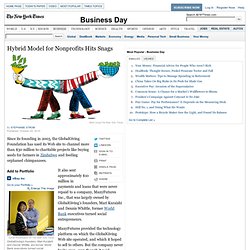
ManyFutures provided the technology platform on which the GlobalGiving Web site operated, and which it hoped to sell to others. But the company never broke even, even though it paid nothing for the platform, which had been donated to ManyFutures. In late 2008, GlobalGiving converted its loans into ownership of the company, paying Ms. Kuraishi and Mr. They had invested $1.4 million. Kiva's U.S. Microloans Programs Expanding. October 20, 2010; Source: San Francisco Chronicle | Kiva, the San Francisco-based nonprofit credited with bringing microlending via the internet to developing countries, has now added the Gulf Coast to the places where it is making microloans in the United States.
While Kiva is still primarily focused on overseas lending—through its internet-based program that lets individuals make loans for as little as $25 to entrepreneurs—it has been running pilots in New York City and San Francisco since the summer of 2009. The goal has been to determine willingness of individuals in this country to support local entrepreneurs and small businesses with microloans. As part of that growth strategy, Kiva announced earlier this week it is forming a partnership with ACCION, which the San Francisco Chronicle says is the "nation's largest microlender," to make loans in Louisiana.
The Chronicle cites one estimate that suggests that small businesses in the U.S. go "unserved by banks at $20 million. " Nonprofit Cafe's Pay What You Want Policy Starting to Pay Off. Related Articles October 5, 2010; Source: St. Louis Today.com | In case you are wondering, even though patrons pay whatever they like for a meal at St. Louis Bread Co.'s nonprofit cafe, they are expected to pay something. As Terri Barr, one of the greeters at the cafe, located outside St. In operation since May, the restaurant is meant to offer low-cost meals for those who can't afford the full price, with better off diners expected to pay closer to, if not, the full suggested retail price. Any money the restaurant clears, after deducting operating costs, will ultimately be donated to support social service projects.
The cafe, which is run by the charitable foundation of Panera Bread Co., is coming close to breaking even, according to Ron Shaich, company chairman. The company already supports programs to address hunger through donations—which St. 6 Reasons Why L3Cs Are Essential to the Future of Social Enterprise ... In a recent article for Justmeans, I argued that the Low-profit Limited Liability Company (L3C), a new legal designation that is perfectly suited for social enterprises, could change the face of grant-making in the United States because it will make it significantly easier for private foundations to make program related investments (PRIs).
Yesterday, I ran down reasons one through three why social entrepreneurs need to be excited about the L3C. Here are three more reasons that the L3C designation will be a huge boon to the burgeoning field of social enterprise. 4. Creates a tax structure that is appropriate to hybrid companies. 6 Reasons Why L3Cs Are Essential to the Future of Social Enterprise ... {*style:<i> In a recent article for Justmeans, I argued that the Low-profit Limited Liability Company (L3C), a new legal designation that is perfectly suited for social enterprises, could change the face of grant-making in the United States because it will make it significantly easier for private foundations to make program related investments (PRIs). Here are three more reasons that the L3C designation will be a huge boon to the burgeoning field of social enterprise.
Profits for Nonprofits. Related Articles August 3, 2010; Source: Wall Street Journal | For those of you that do not already know, the Wall Street Journal now prints a “Donor of the Day” column that has become a must read for many. Yesterday Suzanne Sunshine was profiled. This author knew Ms Sunshine at LISC where she was the unsung hero in LISC’s program for helping CDCs develop supermarkets in low-income neighborhoods. Last year, she started a private, for-profit real estate brokerage and consulting firm specializing in nonprofit office space.
L3C: Pot of Gold or Space Invader? For-profit companies continue to seek ways to obtain two benefits that are usually reserved for nonprofits: foundation grants and government tax exemptions. These efforts are led by both well-meaning individuals as well as those that simply want funding without community accountability. A Factory Defies Stereotypes, but Can It Thrive? A Living Wage. Skoll—Profit Motive Good for Social Mission? Related Articles June 12, 2010; Source: Mercury News | Last week, the Nonprofit Quarterly referenced the five mega-philanthropists who pledged $45 million toward the Obama Administration’s Social Innovation Fund. One was Jeff Skoll of the Skoll Foundation, who became an overnight millionaire, then billionaire due to this good fortune of being hired as the first employee of the internet auction site that became eBay.